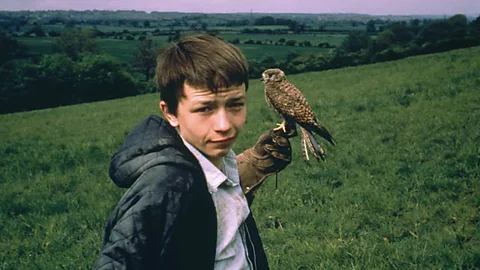 Alamy
AlamyFirst launched in November 1969, Ken Loach’s social-realist story of a boy who adopts a kestrel nonetheless resonates and has turn into a timeless traditional of British cinema.
When director Ken Loach and producer Tony Garnett first screened Kes for British movie executives within the autumn of 1969, they have been assured that they’d created one thing genuine and necessary.
Primarily based on Barry Hines’s 1968 novel A Kestrel For a Knave, and written by Loach, Hines and Garnett, Kes tells the story of Billy Casper (Dai Bradley), a South Yorkshire teenager from a dysfunctional household who struggles in school. He finds a brand new lease of life when he adopts and trains a just lately hatched kestrel he names Kes.
However Loach and Garnett’s pleasure over the movie was short-lived. When the screening completed, the executives informed them that the accents have been so heavy and Kes was such a regional story that it might premiere within the Yorkshire metropolis of Doncaster and have solely a restricted run in UK cinemas. “There was this concept that it was a neighborhood movie for native individuals,” explains Prof David Forrest, who teaches Movie and Tv Research on the College of Sheffield and just lately wrote a BFI Movie Classics e book on Kes.
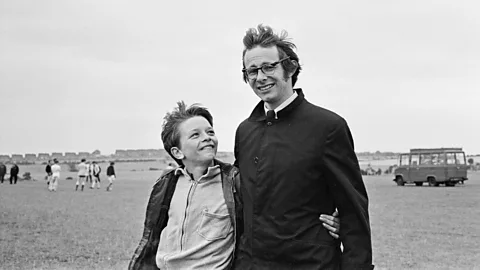 Getty Photos
Getty PhotosLoach and Garnett have been adamant that the executives have been flawed. They insisted that Kes was a movie for everyone and that the “central picture of Billy and the chook was poetic and had a common relevance and enchantment”, Forrest tells the BBC. So as to be sure that the drama was given the discharge it deserved, Garnett turned to his mates within the nationwide press for assist. “He mounted a counter marketing campaign,” says Forrest. “The likes of The Guardian and The Occasions wrote that they have been being stopped from watching the movie. So, clearly, if you say to somebody that one thing is banned, it makes it extra enticing.”
When Kes had a wider launch on the finish of March 1970, it rapidly drew acclaim from critics. Writing in The Spectator, Penelope Houston known as it a “real, resolute little movie”. Roger Ebert wrote that it was “top-of-the-line, the warmest, essentially the most shifting movies of latest years” when it lastly reached US cinemas in 1973. It additionally turned a word-of-mouth hit throughout the UK, and picked up two awards on the 1971 Baftas, with Colin Welland touchdown the perfect supporting actor gong for his portrayal of Mr Farthing, and Bradley being named essentially the most promising newcomer to a number one movie function. However Kes’s influence goes approach past the field workplace it generated and awards it received.
“It is nonetheless related,” Simon Golding, writer of the 2006 e book, Life After Kes, tells the BBC. “Despite the fact that the instances have modified, it hasn’t dated. It is a traditional.”
‘Universality in its messages’
Fifty-five years after Kes had its premiere in London on 14 November, 1969, the coming-of-age drama continues to be thought to be certainly one of Britain’s biggest movies. In 2000, the British Movie Institute ranked it seventh on their checklist of the highest 10 British movies ever made. Kes’s affect will be seen within the sensitivity of Shane Meadow’s work, the guts of Billy Elliot, the dry humour of The Full Monty, and Andrea Arnold’s rugged-yet-poetic exploration of working-class life. Director Krzysztof Kieslowski known as it certainly one of his favorite movies, whereas Christopher Eccleston, Andrew Garfield, Samantha Morton and Daniel Day-Lewis have spoken about the way it impressed them to turn into actors.
Forrest believes that Kes made such an influence and continues to resonate as a result of individuals see themselves within the character of Billy. “There is a universality to the movie and its messages. Whether or not it is scuffling with household, in school, not becoming in, the pleasures of being a toddler, the looming actuality of labor and the uncertainty of the longer term,” he says. Loach’s directorial model makes the movie really feel so lifelike and genuine that it offers the themes much more credibility. “They actually attempt to collapse the boundaries between documentary and fiction so individuals can really feel the political injustices, financial injustices and social injustices that weren’t proven on TV,” says Forrest.
 Alamy
AlamyTo attain this, Loach used most of the similar creative selections as the administrators of the “kitchen sink” dramas of the late Nineteen Fifties and 60s. He shot in real-world areas, comparable to St Helen’s Faculty in Barnsley, South Yorkshire, and employed non-professional actors. In actual fact, Welland was the one working actor to be forged within the movie, and even he had taught at a faculty in Leigh earlier than being forged within the BBC sequence Z-Vehicles. On the similar time, Loach shot Kes “from a distance”, explains Golding, who says that the forged did not get to see different individuals’s scripts. “That allowed for lots of improvisation and he allowed the actors to make errors and do their very own factor.”
However whereas such kitchen sink dramas as Look Again in Anger (1959), Room on the High (1959), and Saturday Night time and Sunday Morning (1960) are in regards to the frustrations, alienation and want of their “indignant younger males” main characters to flee, these characters are sometimes their very own worst enemies. They both keep in a job they despise, get into the flawed struggle or sleep with the flawed lady, which then causes their life to go in a special trajectory or stall.
With Kes, although, Loach makes it clear that Billy’s lack of future choices is not his personal fault. As an alternative, Billy, and each different baby like him, was being let down by the British training system. Between 1945 and 1970, 10 and 11-year-olds took an examination referred to as the eleven-plus that determined the kind of college they might attend. Those who failed the examination, and have been despatched to much less aspirational colleges, usually ended up in handbook labour jobs, together with harmful jobs in mining. Billy is one such baby. As a result of he failed his eleven-plus, he’s destined for a life working in coal mines, and a lot of the academics round him have no real interest in discovering whether or not or not he has some other pursuits. In Life After Kes, Loach says that the movie “ought to be devoted to all of the lads who had failed their eleven-plus. There is a colossal waste of individuals and expertise, usually via colleges the place full potential shouldn’t be introduced out.”
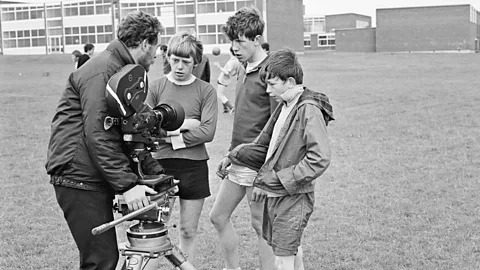 Getty Photos
Getty PhotosThis was one of many the reason why Loach looked for a non-actor who had failed his eleven-plus examination to play Billy. “That was the entire level of the movie,” says Golding. “He wished to point out that what the movie was saying was true. There was this untapped expertise within the youngsters that had failed their eleven-plus exams.” As they struggled to boost its £157,000 funds, Loach, Garnett and Hines have been steadfast of their ambition to make the movie as a result of “they knew it was politically proper”, says Golding. “They knew the story was true.”
‘In the end hopeful’
When Kes was launched, the response from academics proved simply how proper they have been. “Good academics cherished it, unhealthy academics hated it,” says Golding, with Forrest noting that the movie is extra broadly about learn how to “nurture individuals” slightly than simply being an assault on the training system. “Billy does not conform to any of the beliefs of working-class masculinity,” says Forrest. “He is crap in school. He is bullied. He is marginalised. However he is good at plenty of different issues that are not actually represented or acknowledged by the curriculum and society.”
Somewhat than being weighed down by its intense themes of bullying and poverty, Kes manages to stay enjoyable, humorous and finally hopeful, regardless of some undeniably unhappy moments. Loach directs Billy’s growing reference to the kestrel in a hovering method, mixing John Cameron’s easy but hopeful rating with Chris Menges’s vivid, pure cinematography. The sequence during which a PE instructor pretends to be Bobby Charlton in a recreation of soccer towards his pupils is etched in British movie lore, because of the deluded pleasure in Brian Glover’s efficiency, and Loach’s use of the theme from BBC Radio’s Sports activities Report, which was recognized by hundreds of thousands because it has been heard each week on British radio since 1948. In the meantime, Bradley tenderly exhibits Billy gaining confidence, particularly when he is in entrance of the category detailing his relationship with Kes. And when Mr Farthing (Welland) goes the additional mile to attach with Billy, it hints that there’s hope to be discovered amidst the bleakness.
Loach, Garnett and Hines’s refusal to take the movie into overly mawkish and mawkish territory solely enhanced its popularity and influence. This method will be seen most clearly within the last scenes. After failing to placed on a successful guess for his elder brother Jud (Freddie Fletcher), Billy returns house to seek out that Jud has killed Kes and dumped the kestrel’s physique on high of a bin. Their mom (Lynne Perrie) scolds Jud calmly, insisting that he should not have executed it, however is extra involved that there’s a lifeless chook in her kitchen.
In different movies, it may be closely implied that this was the begin to Billy’s life working with animals. Perhaps Mr Farthing would assist to get Billy a job in a zoo. Some even suggested Loach to incorporate such scenes. “That misses the entire level,” says Golding. “This isn’t the tip for Billy Casper. That is simply the tip of 1 chapter. Life is a sequence of occasions. He’ll do one thing else.”
As an alternative, Kes merely ends with Billy burying the kestrel on the hillside overlooking the sector the place they’d flown collectively. “There’s something very highly effective about the best way the movie resists symbolism and the concept it is not simply in regards to the chook which means freedom,” says Forrest. “It goes past that. We all know that Billy has the capability for endurance, that he has the flexibility to nurture relationships with non-humans. I argue that the movie is extra optimistic than individuals take into account.”
With social mobility in Britain nonetheless comparatively restricted, and alternatives for working-class individuals nonetheless at a premium, Forrest believes that discovering hope in Kes is simply as necessary at this time because it was when the movie was launched. “There is a sense of inequality that exists in Britain and its cities. Kes continues to be a very highly effective useful resource – not only for telling us what life was like within the late Sixties, however for a way we make a greater world at this time.”
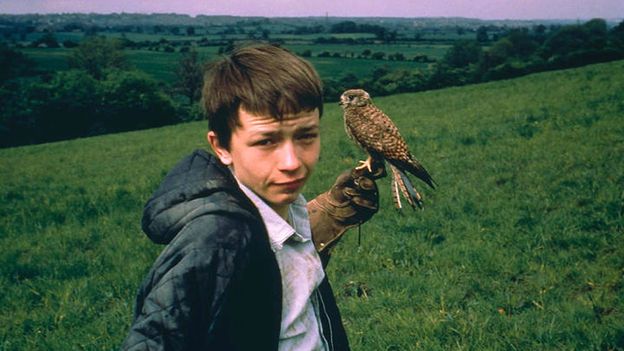


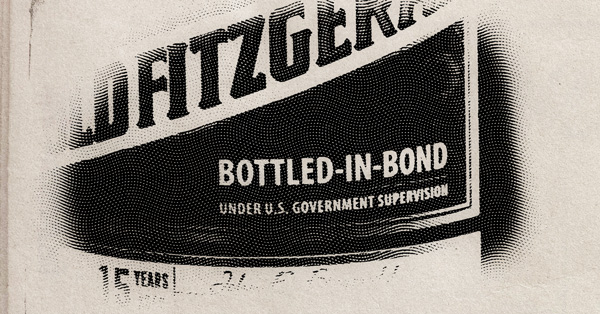



Leave a Reply